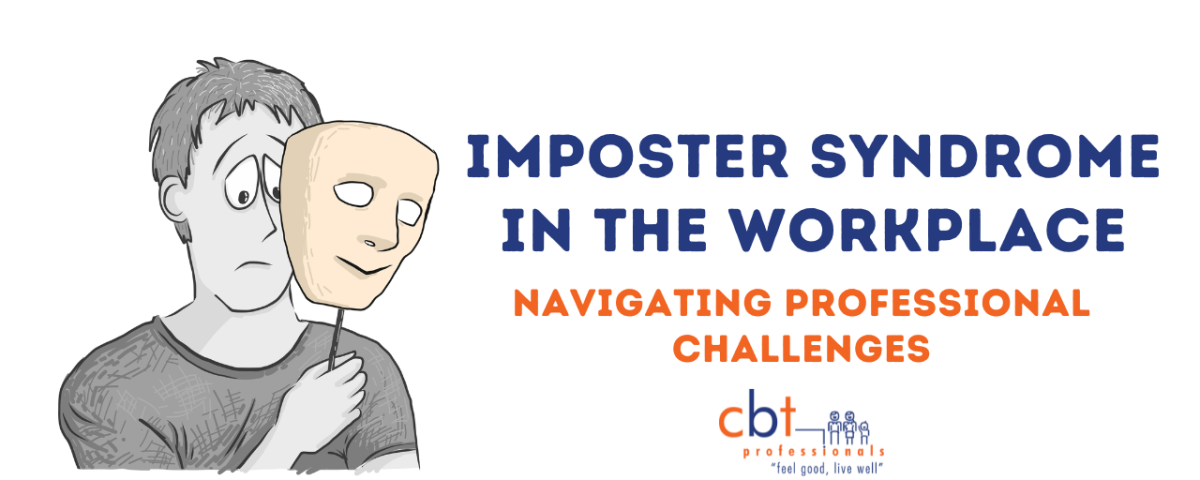Imposter Syndrome in the Workplace: Navigating Professional Challenges
Imposter syndrome, a psychological phenomenon characterised by persistent feelings of self-doubt and inadequacy despite evident success, is a prevalent issue in modern workplaces. Whether you’re a seasoned professional or a newcomer to the workforce, the spectre of imposter syndrome can cast a shadow over your career journey, impacting your confidence, productivity, and overall well-being. In this blog post, we will delve into the intricacies of imposter syndrome, explore its manifestations in the workplace, and discuss strategies for overcoming its debilitating effects.
Understanding Imposter Syndrome
First coined by psychologists Pauline Clance and Suzanne Imes in 1978, imposter syndrome refers to the persistent belief that one’s achievements are a result of luck or deception rather than genuine ability. Despite external evidence of competence, individuals experiencing imposter syndrome often feel like frauds, fearing that they will be exposed as incompetent impostors at any moment. This psychological phenomenon transcends demographics and can affect individuals across various professions, from entry-level employees to top executives.
How can Imposter Syndrome manifest?
Perfectionism
Setting excessively high standards for oneself and experiencing intense anxiety when unable to meet them.
Attributing Success to External Factors
Dismissing personal achievements as a result of luck, timing, or favourable circumstances rather than acknowledging one’s own skills and efforts.
Fear of Failure
Paralysing fear of making mistakes or falling short of expectations, leading to procrastination and avoidance of challenges.
Comparing Oneself to Others
Constantly measuring one’s accomplishments against those of others, often resulting in feelings of inferiority and inadequacy.
Difficulty Accepting Praise
Dismissing compliments or positive feedback and attributing them to flattery or insincerity.
Imposter Syndrome in the Workplace
The competitive nature of the modern workplace, coupled with the pressure to excel and continuously prove oneself, provides fertile ground for imposter syndrome to flourish. In professional settings, individuals grappling with imposter syndrome may experience a range of challenges that hinder their performance and career advancement:
- Undermined Confidence
Persistent self-doubt can erode confidence and prevent individuals from pursuing opportunities for growth and advancement.
- Stifled Creativity and Innovation
Fear of failure may stifle creativity and innovation, as individuals become reluctant to take risks or propose unconventional ideas.
- Burnout and Stress
The constant pressure to maintain a facade of competence can lead to burnout and chronic stress, negatively impacting both mental and physical health.
- Career Paralysis
Imposter syndrome can impede career progression, as individuals may shy away from seeking promotions or pursuing new challenges due to a fear of inadequacy.
- Strained Relationships
Difficulty accepting praise or acknowledging accomplishments may strain relationships with colleagues and supervisors, hindering collaboration and teamwork.
Navigating Professional Challenges
While overcoming imposter syndrome is not easy, there are strategies that individuals can employ to navigate its challenges and cultivate a healthier mindset:
Acknowledge and Normalise Feelings
Recognise that imposter syndrome is a common experience shared by many professionals, regardless of their level of success. Normalise your feelings of self-doubt and understand that they do not define your competence or worth.
Challenge Negative Self-Talk
Practice self-compassion and challenge negative self-talk by reframing your thoughts in a more balanced and realistic manner. Focus on your strengths and accomplishments rather than fixating on perceived shortcomings.
Set Realistic Goals
Set achievable goals that stretch your abilities without overwhelming you. Break larger tasks into smaller, manageable steps, and celebrate your progress along the way.
Seek Support and Feedback
Reach out to mentors, colleagues, or trusted friends for support and feedback. Share your experiences with others who may have faced similar challenges and benefit from their perspective and guidance.
Embrace Vulnerability
Embrace vulnerability and be willing to acknowledge your limitations and mistakes. Remember that vulnerability is not a sign of weakness but rather a testament to your courage and authenticity.
Practice Self-Care
Prioritise self-care and engage in activities that nourish your mind, body, and spirit. Take breaks when needed, cultivate hobbies outside of work, and prioritise activities that bring you joy and fulfilment.
Celebrate Successes
Learn to accept compliments and celebrate your successes, no matter how small. Keep a record of your achievements and reflect on your progress over time.
By implementing these strategies and fostering a supportive work environment that values authenticity and vulnerability, individuals can navigate the challenges of imposter syndrome and thrive in their professional endeavours.
Remember that overcoming imposter syndrome is a journey, and it’s okay to seek help and support along the way.
With self-awareness, resilience, and a willingness to embrace vulnerability, you can rise above imposter syndrome and achieve your full potential in the workplace.
We are passionate at CBT Professionals about helping you work through your imposter syndrome. We know that it isn’t an easy fix, and reworking the way you perceive yourself will take time.
Reach out today, we can be beside you as you take the first step to recovery:
Coomera – (07) 5551 0251
Nerang – (07) 5668 3490
Mount Gravatt – (07) 3102 1366
If you, or someone you know, require help, please reach out to organisations like Beyond Blue.
Additionally reach out to these organisations that may be able to help.
- ReachOut (youth mental health service) — online help
- SANE Australia — call 1800 187 263
- Mental Illness Fellowship of Australia (MIFA) — call 1800 985 944
- LifeLine 13 11 14 — for anyone in crisis
(Health Direct, 2020).
If this is an emergency, please contact 000 or visit your local emergency department.
THUMBNAIL CARTOON
https://www.smashingmagazine.com/2017/10/confessions-impostor-syndrome/
THREE CONVENIENT LOCATIONS
MOUNT GRAVATT
Mt Gravatt Medical PrecinctSE 105, 1808 Logan Rd
Upper Mount Gravatt QLD 4122


